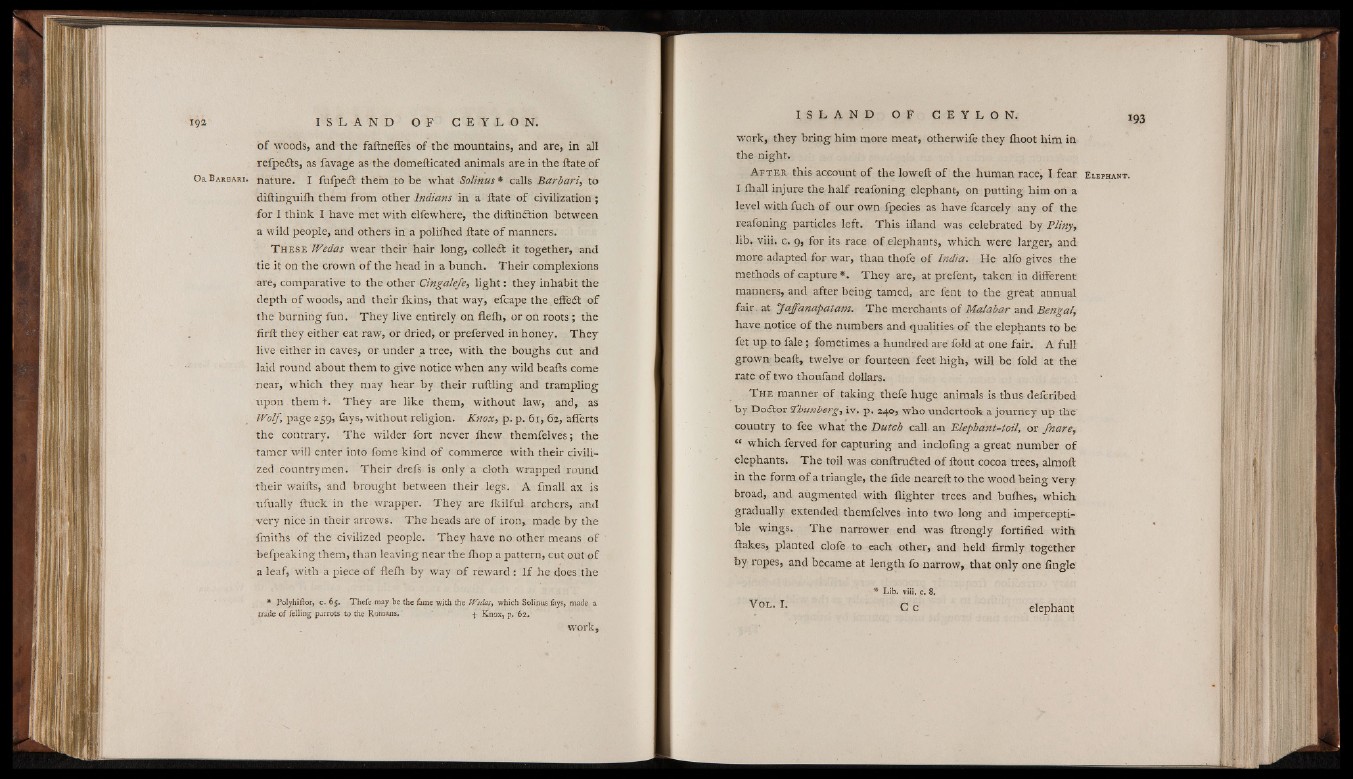
of woods, and the faftneffes of the mountains, and are, in all
refpects, as favage as the domefticated animals are in the ftate of
O r B a r b a r i . nature. I fufpect them to be what Solinus* calls Barbari, to
diftinguifh them from other Indians in a ftate of civilization ;
for I think I have met with elfewhere, the diftinftion between
a wild people, and others in a polilhed ftate o f manners.
T h e s e Wedas wear their hair long, colled! it together, and
tie it on the crown o f the head in a bunch. Their complexions
are, comparative to the other Cingalefe, light: they inhabit the
depth of woods, and their ikins, that way, efcape the effedl of
the burning fun. They live entirely on fleih, or on roots ; the
firft they either eat raw, or dried, or preferved in honey. They
live either in caves, or under a tree, with the boughs cut and
laid round about them to give notice when any wild beafts come
near, which they may hear by their ruffling and trampling
upon them t. They are like them, without law, and, as
Wolf page 259, lays, without religion. Knox, p. p. 61, 62, afferts
the contrary. The wilder fort never fhew themfelves; the
tamer will enter into fome kind o f commerce with their civilized
countrymen. Their drefs is only a cloth wrapped round
their waifts, and brought between their legs. A fmall ax is
ufually ftuck in the wrapper. They are ikilful- archers, and
very nice in their arrows. The heads are of iron, made by the
fmiths of the civilized people. They have no other means of
befpeaking them, than leaving near the ihop a pattern, cut out of
a leaf, with a piece o f fleih by way o f reward : If he does the
* Polyhiftor, c. 65. Thefe may be the fame with the IVedaf, which Soiimis fays, made a
trade of felling parrots to the Romans,' f Knox, p. '62.
work,
work, they bring him more meat, otherwife they ihoot him in
the night.
A f t e r this account o f the loweft o f the human race, I fear E l e p h a n t .
I ihall injure the half reafoning elephant, on putting him on a
level with fuch o f our own fpecies as have fcarcely any of the
reafoning particles left. This iiland was celebrated by Pliny,
lib. viii. c. 9, for its race of elephants, Which were larger, and
more adapted for war, than thofe o f India. He alfo gives the
methods of capture *. They are, at prefent, taken in different
manners, and after being tamed, are font to the great annual
fair, at Jaffanapatam. The merchants of Malabar and Bengal,
have notice of the numbers and qualities of the elephants to be
fet up to fale; fometimes a hundred are fold at one fair. A full
grown beaft, twelve or fourteen feet high, will be fold at the
rate o f two thoufand dollars.
T h e manner o f taking thefe huge animals is thus defcribed
by Doftor Thunberg, iv. p. 240, who undertook a journey up the
country to fee what the Butch call, an Elepbant-toil, or fnare,
“ which ferved for capturing and inclofing a great number o f
elephants. The toil was conftruiled o f ftout cocoa trees, almoft
in the form o f a triangle, the fide neareft to the wood being very
broad, and augmented with ilighter trees and buihes, which
gradually extended themfelves into two long and imperceptible
wings. The narrower end was ftrongly fortified with
flakes, planted clofe to each other, and held firmly together
by ropes, and became at length fo narrow, that only one fingle
V o l . I.
Lib. viii. c. 8.
C c elephant